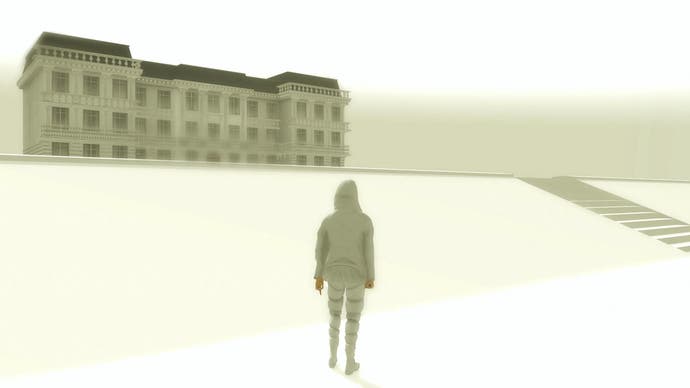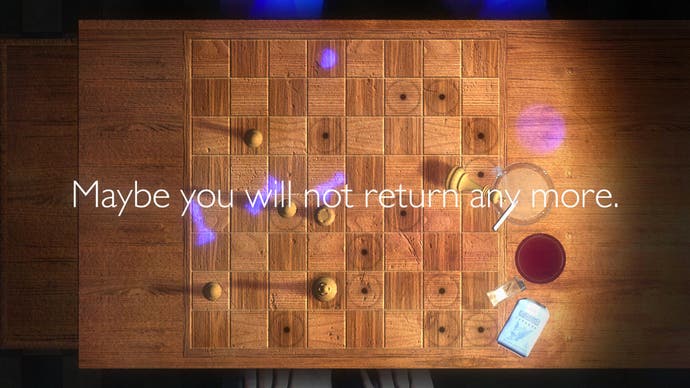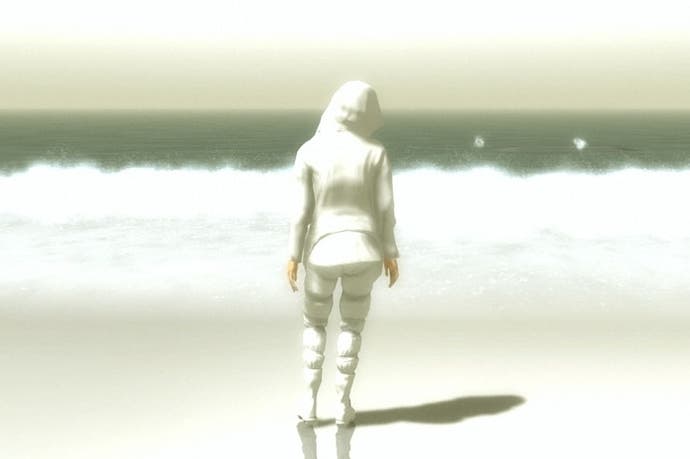Exploring Bientôt l'été
Once more unto the beach with Tale of Tales' latest.
Outside, white sands lead down to the shoreline. Clothes rustle in the breeze, gulls flock and scatter by the surf, and two slatted seats are placed at each end of the boardwalk, painted white and facing away from each other. Maybe they've had an argument. Up the dunes a little there is a building with a single door. Beyond the door is a café where you can drink and smoke and play chess on a cheap wooden board. The pieces are large and probably old. They have those little felt circles tacked underneath them.
In terms of real-estate, that's about all that you can expect from Bientôt l'été, the latest notgame project from Belgian outfit Tale of Tales. By this team's standard, the beach, the café, the endless fluttering of the sea means we're getting off pretty lightly. Previous works have certainly been a little more sinister - a little more obviously sinister, at least.
The Path took us into the dark woods of fairy tales and then lost us there. Fatale, meanwhile, restaged Salome, and Salome's hardly an all's-well-that-ends-well proposition. After that sort of thing, Bientôt l'été wants to lead us - where, exactly? Maybe that beach, that café, and the endless fluttering of the sea will give you the answer.

Outdoors, you're alone, right? The ocean murmurs, the billowing soundtrack shifts and occasionally moans, and as you walk back and forth, you collect a series of phrases that fill the screen with their scrolling text: What could we do? I know nothing anymore before today. No. You can close your eyes - there's a button for it and everything - and the mood changes: the audio takes on insistent electronic pulses, the geometry is rebuilt in glowing blue lines, and you can move at double speed if you so wish, zipping along this short stretch of beach until you've found the invisible walls at either end - and seen the figure who stands watching you behind those walls.
Occasionally you'll spot an apparition: a pile of coal, a huge mechanical crane, a tennis court. When you move in close to investigate, it will disappear, generally - but not quite always - leaving you with a chess piece. These pieces are used on the board back in the café, each apparition you find adding to your store. The chess moves you make let you construct a conversation from the phrases you've collected as you pace around outside - a conversation that plays out with either another player, randomly selected from somewhere around the world, or a simulated player when no real ones are available.
The whole thing's intrigued by simulation, it seems - simulation and the distance, the layering, the separation that simulation imposes. The game's a simulation of a simulated beach: one fake stuffed inside another, while the conversations you have - wayward, tangled, nonsensical, pin-wheeling raggedly between talk of wine, of love and of fear - take place in a manner that elegantly heightens the artificiality of it. It's all so contradictory: your proximity to your café partner does not necessarily translate to closeness, and yet the jumbled chatter that spins to and fro as you muddle the chess board and work through the phrases you've gathered can sometimes sound authentically human in its cross-purposes, in the words' inability to connect cleanly.

It makes for an experience that's both unruly and yet strangely focused: go where you want, do whatever the controls allow for, but know that progress - it's impossible to see it as anything else if you come from games - will always be easy to achieve, and the many questions floating about will forever keep you moving forward. Tale of Tales refers to Bientôt l'été - the translation the team prefers is the strangely unmusical “It's nearly summer” - as a game about love, about the complexities and varieties of love. It can also feel like a game about the difficulties of love, about the ambiguities that are thrown up by communication and by isolation. By intimacy.
It's also apparently inspired by the work of Marguerite Duras, a novelist and film-maker whose books include Moderato Cantabile, which was turned into a movie called Seven Days… Seven Nights - though be careful when renting it lest you end up with Six Days, Seven Nights, and are left to ponder, in a melancholy fashion, the diminishing power of Harrison Ford. It's from this narrative in particular (again - not talking about Six Days, Seven Nights here) that Bientôt l'été borrows its setting, its situations, and a carefully framed ambiguity - along with a predilection for magnolias and glasses full of wine. On top of that, it also gains a fascination with repetition tempered by occasional variation that lends the game a hypnotic effect.
Will Self has a handy word for this manner of thing, I think: under-imagined. Never accidental, it's a word to bust out whenever the gaps left within something seem artful and weirdly crucial, when the whole piece feels constructed - or half-constructed - with a definite, maybe rather personal, intent, but encourages you to come up with your own responses, too. Bientôt l'été's a fascinating way to spend an hour or so, at any rate: exploring a beach that isn't a beach, a café that isn't a café, and a relationship that - well, I'll leave that one up to you.









